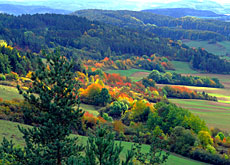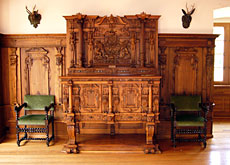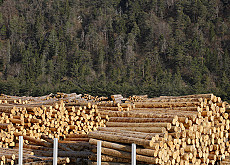Forests seen as vital to quality of life

A ministerial conference on forest protection has ended with a call for sustainable management of Europe's woods, and increased use of forests in energy production.
Switzerland, a third of which is covered in forest, was one of 46 European countries at the three-day “Forests for quality of life” conference, held in the Polish capital, Warsaw.
A final declaration on Wednesday stressed the importance of forests in maintaining and enhancing water quality and in mitigating natural hazards.
Two resolutions called for the enhanced use of wood in energy production, and the restoration of degraded forests to help reduce floods and protect the soil.
“We are satisfied with the results because also for Switzerland the forests are a key factor for sustainable development,” Andreas Götz, vice-director of the Federal Environment Office, told swissinfo.
“Forests are an excellent mitigation for natural hazards, and forests play a role in biodiversity, and not least in the economy.”
Warsaw Declaration
Ministers responsible for forests, EU representatives and delegates from observer countries and international organisations all took part in discussing the priorities of forest policy in Europe.
“Its important to exchange experiences in forest management,” Götz said. “We see that we have similar problems to [those of] other countries.”
In the main document of the conference, the Warsaw Declaration, countries commit themselves to common activities towards further implementation of sustainable forest management.
The declaration presents a meaningful role for forests in improving the living standards on the planet and a long-term vision of the future of forests in Europe.
Given the inevitable consequences of climate change, the ministers also adopted two resolutions.
The first, “Forests, wood and energy”, obliges states to increase the role of the forest sector in energy production, and the use of forest biomass for renewable energy and for reduction of greenhouse gas emissions. It also obliges them to enhance public and private partnerships between forest owners, the wood industry and energy producers.
The second resolution, “Forest and water”, draws attention to water resources and stresses the role of forests in protecting the quality and quantity of water, preventing floods, mitigating the effects of drought and counteracting soil erosion.
“The next step is to put these resolutions into practice because… we need action. Only if we have action can we change and develop the sustainable management of forestry,” said Götz.
swissinfo
73% of Swiss forests are publicly owned; the remaining 27% is in the hands of 250,000 private owners.
A third of the country is covered in trees. In some areas, such as the Jura region, this goes up to 40%.
The forestry industry is worth SFr7 billion ($6.2 billion) and employs more than 70,000 people.

In compliance with the JTI standards
More: SWI swissinfo.ch certified by the Journalism Trust Initiative


You can find an overview of ongoing debates with our journalists here . Please join us!
If you want to start a conversation about a topic raised in this article or want to report factual errors, email us at english@swissinfo.ch.